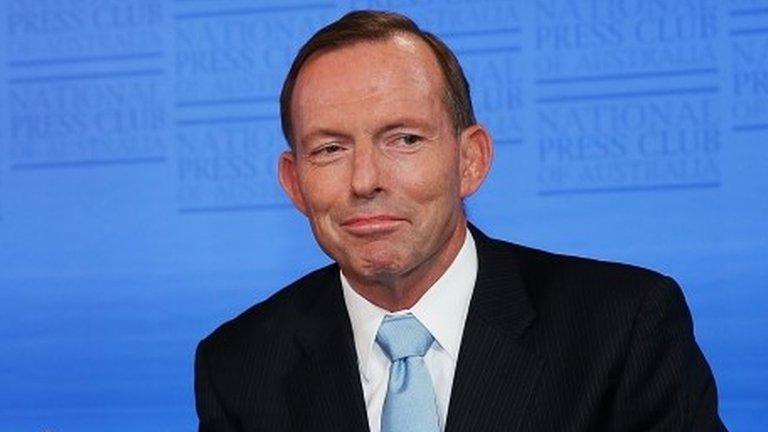Profile: Former Australian PM Tony Abbott
- Published
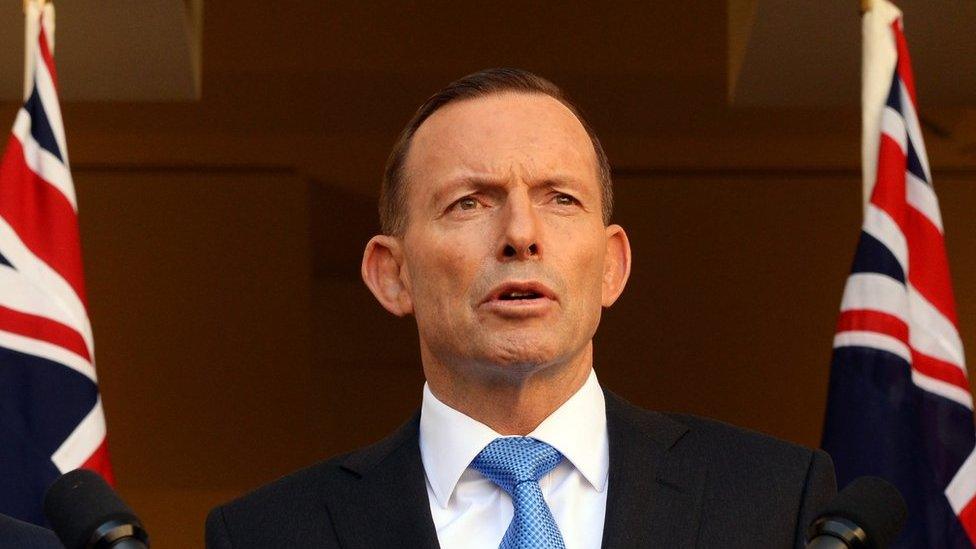
Tony Abbott was already a polarising figure when he became prime minister of Australia in 2013.
A former Rhodes Scholar who once wanted to be a monk, he attracted early criticism for gaffes and was famously called a misogynist by former Labor Prime Minister Julia Gillard.
In September 2015, he was ousted as prime minister by his colleague Malcolm Turnbull after a tumultuous premiership.
Now the UK government is said to be considering appointing him to the board negotiating post-Brexit trade deals.
The appointment - which has yet to be officially confirmed - has attracted a lot of comment from British MPs, much of it negative.
But government ministers have downplayed claims Mr Abbott's past comments show he is a "homophobe" or a "misogynist" - and stressed his experience in negotiating trade deals.
Mr Abbott was also a keen supporter of Brexit, and has argued that the UK has nothing to feat from a "no deal" exit from EU trading rules at the end of this year.
He struck up a friendship with Boris Johnson when the latter was foreign secretary, and when Mr Johnson won last year's general election, the former Australian PM tweeted that his British friend, external "has the courage and the passion to keep Britain great".
'Mad monk'
Tony Abbott was born in 1957 in England to Australian parents who returned to Sydney a few years later.
After graduating in economics and law from the University of Sydney, where he was also a leading student boxer, he attended Oxford as a Rhodes Scholar, studying politics and philosophy.
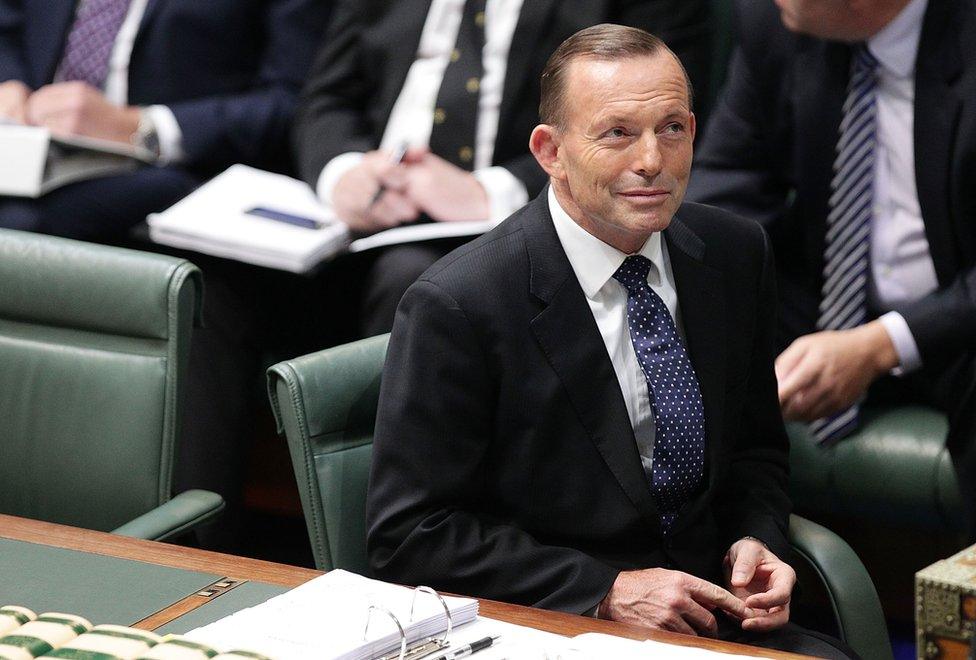
When in opposition he was known as "Tear-down Tony"
He briefly trained as a Catholic priest, before working as a journalist for the Australian newspaper.
He then worked as an adviser to the Liberal Party, before entering politics in 1994 when he was elected to represent the affluent Warringah district of Sydney.
Under former Prime Minister John Howard, he served as an employment minister, between 1998 and 2001 and as minister for health and ageing in 2003.
In 2009, he narrowly beat incumbent Malcolm Turnbull in a party leadership vote, winning 42 votes to Mr Turnbull's 41. Many pundits were shocked by the result, given Mr Abbott's gaffe-prone history.
As leader of the opposition, Mr Abbott's aggressive approach earned him several nicknames. His tactics led some to call him "Tear-down Tony" or "Mad Monk" - a reference to his time spent training as a priest.
He consistently voted against relaxing laws on abortion, same-sex marriages and stem cell research. In 2010, he told a 60 Minutes interview that he would "probably feel a bit threatened" by homosexuality but later apologised for the remark.
His stance on social issues, and his poor polling among women, led some to say that Mr Abbott has a "women problem". In October 2012, Ms Gillard's blistering speech in parliament, external accusing him of misogyny, highlighting comments he had made about women in authority, went viral online.
'Stop the boats'
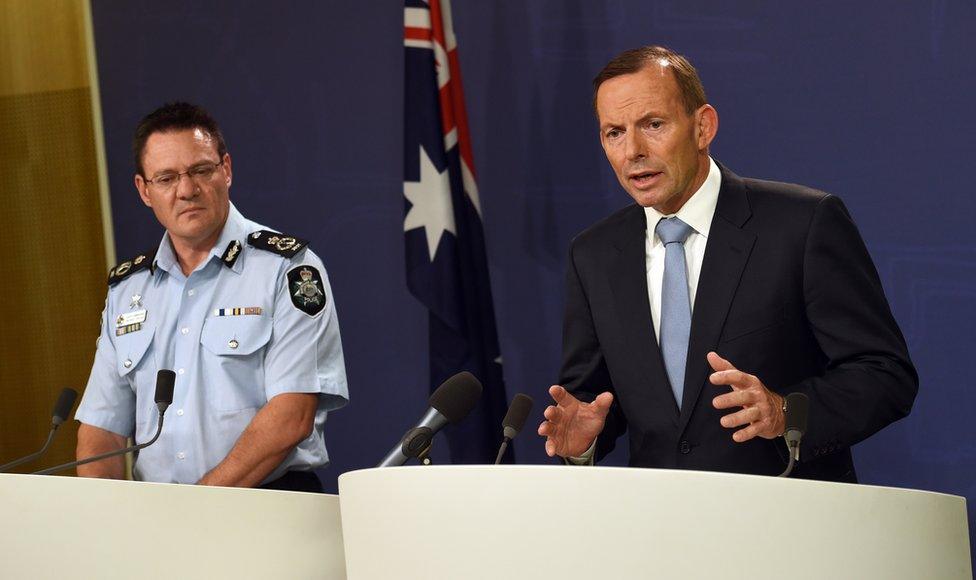
Mr Abbott, seen here with Australian Federal Police deputy commissioner Michael Phelan, pushed for more anti-terror measures
He took on Labor's Kevin Rudd - who ousted Ms Gillard as Labor leader - in the September 2013 polls and secured a convincing win.
Upon his election as prime minister, Mr Abbott was criticised for only having one woman, Liberal deputy leader Julie Bishop, in his cabinet.
Ahead of the election, Mr Abbott had argued for tough border controls, lower taxes and a smaller government.
He supported Labor's policy of processing asylum seekers offshore, and went further - calling for asylum boats to be turned around and for those in Australia approved as refugees to be limited to temporary visas.
He followed through on these promises, to great controversy, setting up a military-led border patrol called Operation Sovereign Borders.
Raw onion
Mr Abbott was applauded for pushing for an investigation into the downing of Malaysia Airlines flight MH17, which killed 38 Australians.
He also controversially threatened to "shirtfront" Russian leader Vladimir Putin ahead of the November G20 summit in Brisbane over the MH17 incident - but the two appeared cordial when the meeting took place.
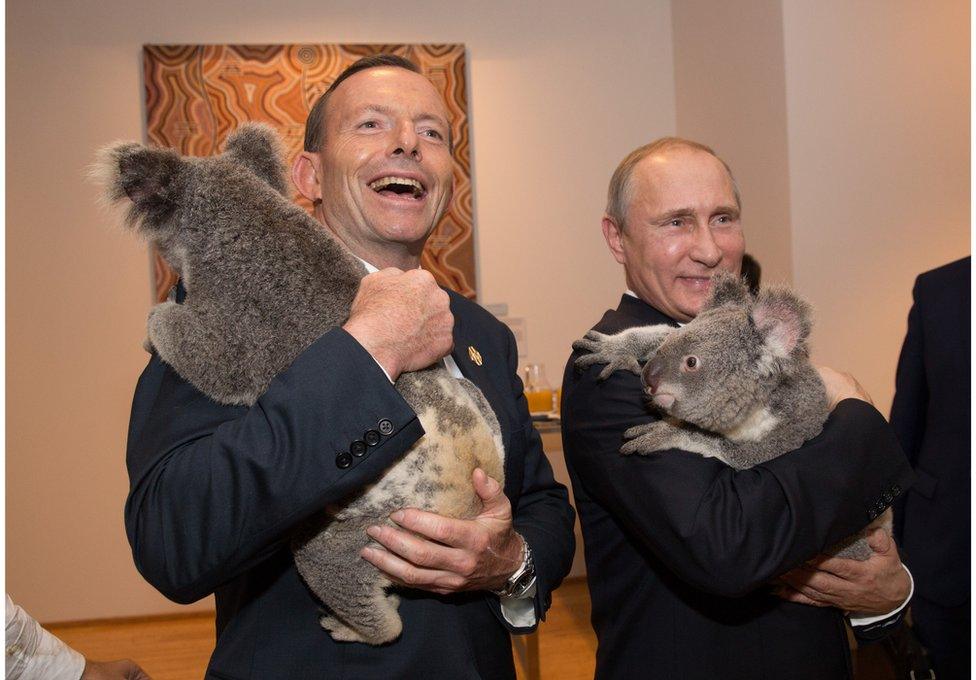
Mr Abbott and Mr Putin cuddled koalas at the G20
In July 2014, the Australian Senate voted to repeal a carbon tax, a levy on the biggest polluters, that the previous Labor government had implemented, something Mr Abbott had strongly argued for.
He dismissed climate change as "faddish", but said he is not a climate sceptic.
He has said he accepts that "climate change is real, humanity makes a contribution," but he told a climate-sceptic thinktank, the Global Warming Policy Foundation, that it is "probably doing good; or at least, more good than harm."
He argued that higher concentrations of carbon dioxide act as "plant food" and "are actually greening the planet and helping to lift agricultural yields".
In December 2019, he claimed that the world was "in the grip of a climate cult".
Mr Abbott's administration concluded a series of free trade deals with China, Japan and South Korea.
Towards the end of his premiership he has started losing favour with voters, who disagreed with his proposed changes to university fees and Medicare. His decision to award an Australian knighthood to the Duke of Edinburgh in January 2015 was also met with derision.
In the same year, a video of Mr Abbott biting into a raw onion, external, on a visit to a farm in Tasmania, went viral. He later explained the bizarre incident, saying it was "beautiful" to eat and he wanted to show his "appreciation" to the farmer.
After a leadership election, which he lost to Mr Turnball, he returned to the backbenches and was re-elected to his Warringah seat in 2016. He eventually lost his seat at the 2019 federal election.
Brexit trade appointment
Caroline Nokes says appointing former Australian PM Tony Abbott as a UK trade representative would be "awful"
In the summer of 2020, reports emerged that Mr Abbott could be appointed to a role in the UK's post-Brexit trade talks.
Labour opposition and some government Tory MPs say he is unfit to represent the UK due to his views on climate change and past "misogynist" and "homophobic" comments.
Labour leader Sir Keir Starmer said: "I have real concerns about Tony Abbott, I don't think he's the right person for the job. If I was prime minister, I wouldn't appoint him."
Conservative former minister Caroline Nokes, who chairs the Women and Equalities select committee, was the most vociferous in her condemnation of Mr Abbott's rumoured appointment, telling the BBC's Politics Live: "I am not sure I can come up with words for how awful I think it is."
But the UK's trade minister, Greg Hands, told MPs he welcomed Mr Abbott's desire to "help this country out", while Health Secretary Matt Hancock said he did not believe Mr Abbott is homophobic or misogynistic, and when pushed, added: "He is also an expert on trade."
- Published4 September 2020
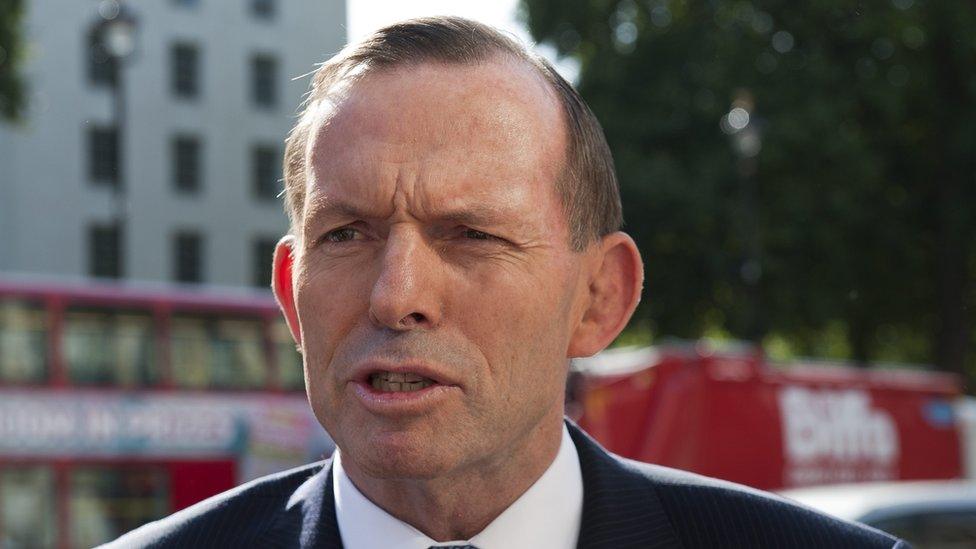
- Published6 February 2015
